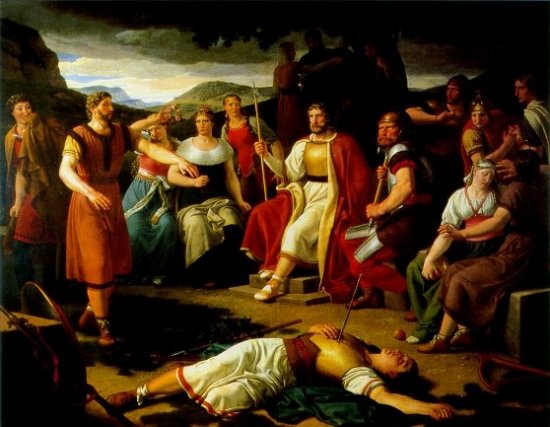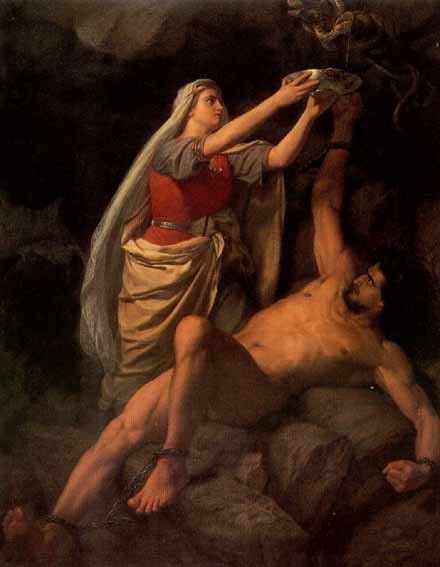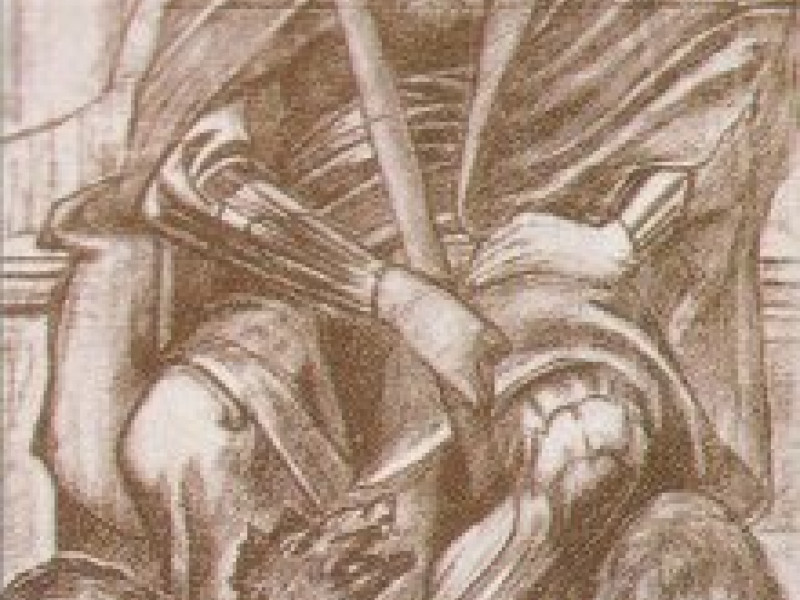Death of Balder
Another sign that the end of the world was coming, was the death of Balder (Baldr).
Balder was the beautiful son of Odin and Frigg. Balder was also the brother of Hod and Hermod. His twin brother Hod was a god suffering from blindness, and therefore was the god of darkness. Meanwhile, Balder was the most beloved of all the gods.
However, Balder had a dream that he was destined to die, and his death would be one of the causes or signs of the coming of Ragnarök. In Baldrs draumar ("Dream of Balder") from the Poetic Edda, Odin used his skill in necromancy to summon the dead prophetess about the meaning of his son's dream; hoping he could prevent Balder's vision from coming to pass.
Balder's mother Frigg also tried to prevent the prophecy from fulfilling. Frigg travelled throughout the world, extracting an oath from every creature and inanimate object, to not harm her favourite son. Frigg even made objects like the trees and rocks to swear not to harm Balder. Balder became invulnerable to all weapons and objects. Not even fire or water could hurt Balder.
Loki was the god of fire and was commonly known as the Trickster. Loki often played practical jokes on the Aesir, embarrassing the other gods. Loki was mischievous, yet he often helped the gods out of trouble. Loki was never considered to be an evil god...until now. The giants were considered evil and the enemies of the Aesir. Loki, who was a son of a giant, would later become the leader of the frost-giants at Ragnarök.
Loki was determined to cause Balder's death. Loki transformed himself into an old hag and went to find the secret of Balder's vulnerability from Frigg.
Loki discovered that the only thing that did not swear the oath was the mistletoe. Frigg considered that the mistletoe was insignificant and could not possibly harm her son, so she did not ask the plant to swear the oath.
One day at Asgard, the gods were playing a game with Balder. They threw all sorts of objects and weapons at him, and they bounced harmlessly off his body. Only Hod did not play this game.
Loki came before Hod and asked why he did not play with his brother and the other gods. Hod replied that he was blind. Loki gave Hod a twig of mistletoe and told him to play. Guiding Hod's aim, the blind god threw the mistletoe at his brother.
The twig flew like a dart and struck him. Balder instantly fell dead to the ground. Balder's spirit fled to Hel (Niflheim). Frigg and the other gods watched, horrified that the insignificant mistletoe could kill the most favourite god.
Vali, the son of Odin and Rind, killed his half-brother Hod in revenge for Balder's death.
Frigg was grief-stricken and pleaded with her husband to bring her son back. Odin told the other Aesir that one of them must go to Hel (Niflheim) and give a ransom for Balder from Hel, the goddess of the dead.
Only Hermod dared ride on Sleipnir, Odin's steed, to the Underworld to request audience with Hel. Hel would allow Balder to return to Asgard if every creature would weep for Balder, but would keep the dead god in Hel if a single creature refused to shed a single tear for Balder.
Upon this news, Frigg went throughout the world asking for every creature to weep for Balder. Loki changed himself into a giantess Thokk or Thanks. Despite Frigg pleading for her to shed a single tear for her son, Thokk or Thanks (Loki) refused. So Hel kept Balder in her domain.
At the Balder's funeral, Nanna collapsed in her grief and died at his pyre, joining her husband in Hel. Balder was to receive a boat burial. But Hringhorni was the largest ship in the world, and no one could launch it into the sea. So they called upon the giantess Hyrrokkin from Jotunheim to help them. She arrived on a wolf, with vipers as her rein. She only need to touch the ship, for it to roll into the water, but it set fire to the rollers. This angered Thor, who would have killed Hyrrokkin with his mjöllnir, but the other gods insisted that Thor spare her.
Balder's death was one of the signals of the approach of Ragnarök.
When the Aesir found out that Loki was responsible for Balder's death, Loki fled. Loki changed himself into a salmon and hid in Frananger waterfall. The Aesir failed to catch Loki (salmon) using a net. Loki tried to escape to the sea. As he leaped over the net, Thor caught the salmon by its tail.
They took Loki to a cave. They transformed one of Loki's sons, named Vali, into a wolf. Vali killed his brother Narfi. The gods used Narfi's guts to bind Loki to three large rocks. The giantess Skadi placed a poisonous snake above Loki's head. Whenever the venom dropped on Loki's head or body, he would suffer from great agony and convulsion.
Sigyn, Loki's faithful wife, remained at his side, catching the venom in a large basin. However when the basin was full, Sigyn had to empty the basin. The venom would drip on Loki, causing Loki to suffer from violent spasms. His spasms also caused the earth to tremble and shake.
Loki remained confined in the cave until the time of Ragnarök.
According to Saxo Grammaticus in Gesta Danorum, there was a totally different account about Balder's death.
While Saxo says that Balder was Odin's son, Hother (Hod) was not. Hother was the son of Hodbrodd and foster son of Gewar. Nanna was the daughter of Gewar. Balder fell in love with Nanna when he saw her bathing. Since Balder was invulnerable to ordinary weapons, Hother gained a sword and bracelet belonging to Miming the Satyr.
When Balder sued for Nanna's hand in marriage, she refused, because he was immortal while she was mortal. Such unequal partners would be an incompatible match. A war broke out between gods and men; a naval battle took place where the gods were defeated and fled, after Hother's sword cut Thor's club. Hother also gained the kingdoms of Denmark and Sweden.
Despite being defeated, Balder managed to spirit Nanna away from Gewar, marrying her in Sweden. This was followed by Hother's two defeats, which distressed him so greatly that he abandoned his kingdoms and lived a life in self-exile.
As he wandered through the land, he came upon a cave with maidens. These maidens comforted him, advising him that he should steal some food that gives Balder his strength. After another battle with his enemy, Hother went to spy on his enemy. He not only gained Balder's magic food, but the belt that gives victory.
Before Hother left, he seriously wounded Balder with his sword. Balder died three days later. Balder was buried in a barrow.
Hother was killed in a different battle later, against Boe (Vali), son of Odin and Rinda (Rind). See Rind for how Boe (Vali) was conceived through deception.
Related Information
Related Pages
Fact and Figures
By Jimmy Joe






